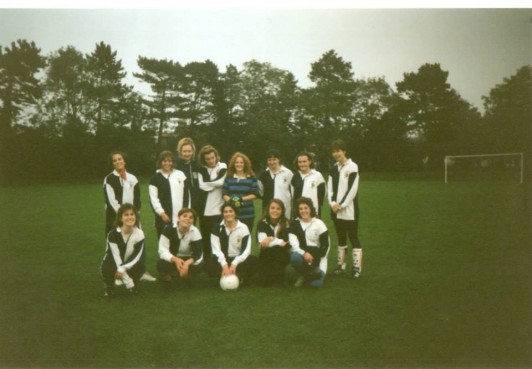Which football (soccer) teams should the English Department be supporting in the 2014 World Cup?
I’m Lisa Fairbrother, Associate Professor in the Department of English Studies, and during the next month I’m going to be sharing my thoughts with you about this year’s World Cup. I’m sure some of you might be wondering why on earth I’ve been chosen as the blogger for the English Department but I assure you I have great credentials : ). Firstly, I like watching football (albeit from the comfort of my sofa at home) and, as I’m sure my husband will agree (with a sigh), I’m a very enthusiastic and vocal supporter. Secondly, I come from the U.K., the birthplace of modern football, and more specifically, Manchester, home to two of the strongest teams in the Premier League and arguably the world: Manchester United and Manchester City. So, you could say that football is in my genes. And, finally, believe it or not, I actually used to be on my college women’s football team when I was at university. I used to play in the midfield/ left flank position (admittedly rather badly) but I can at least appreciate from firsthand experience how incredibly fit you have to be to keep running up and down the pitch for a full 90 minutes without collapsing.
So, the World Cup is about to kick off this week and I’ve been thinking which teams, as the Department of English Studies, we should be supporting. As I come from Britain, the birthplace of English (unless we want to go back a little further in history and argue that actually the birthplace of English is Germany, in which case we should all actually be in the German Department!), the team that comes automatically to my mind is England (or In-ger-la-a-nd as the fans will be shouting). Currently ranked 10th in the FIFA world rankings, England also seems to be the native English-speaking team with the best chance of winning.
However, the England team isn’t the only team representing a predominantly English-speaking nation; this year England is joined by the United States and Australia. Also we mustn’t forget that English is not only used in traditionally native-speaking countries, but it is also the official language of the government, legal system and education of many other countries, including three African nations represented in the World Cup this time: Nigeria, Ghana and Cameroon (which we will have to share with the French Department as French is another of its official languages).
But what if we also think about the general English proficiency of people in the countries represented in the World Cup? If we take the TOEFL world ranking scores into consideration, then we also need to include the Netherlands, which topped the world rankings in 2011/2012. The Netherlands also happen to be ranked 8th in the FIFA world rankings so they have the added benefit of improving our chances of a win.
So that gives us a total of 7 teams to follow: 3 English-native-speaking countries, 3 countries where English is used as an official language and 1 country with the best English test scores. So, keep your eyes on Groups A, B, D, F and G.
Can you spot me in this picture?



















